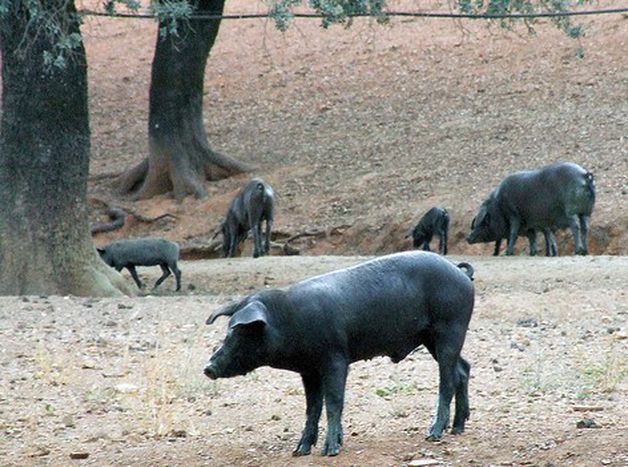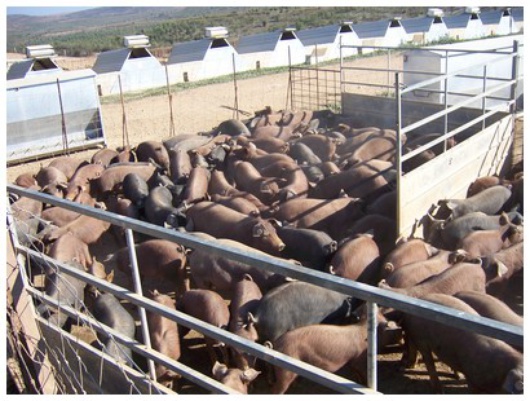
Profession: pig castrator
Published on
Translation by:
Christopher HallOut of the 8 million inhabitants living in Andalusia, barely 10, 000 Andalusians under the age of 35 are farmers. Paco, a young pig castrator, tells his story
How do you take over from somebody in the rural world? This is exactly the point which Mariann Fischer-Boel, commissioner in charge of agriculture and rural development, intends to stress. Today, one of the major problems in this sector is the poor number of young Europeans wishing to devote their professional life to agriculture or breeding (only 8.1% of stockbreeders are under the age of within the heart of the EU).
The lack of information and communication surrounding this type of work is probably one of the reasons for general disinterest.
Focus on a province of Huelva, Andalusia, renowned for its meats and its 'chacinas' label of origin (pork meat prepared for the delicatessen trade). ‘What people don’t realise is that the castrator carries out essential work,’ says Luis (pseudonym), a young Andalusian, 23, who has just started castrating pigs.‘
More than 300 castrations per day
Luis says it himself: he is passionate about his work. He is already among the most respected pig castrators in his region. He began at the age of 14 when a castrator without children suggested to him about learning the trade.
The hardest are the females; anyone can castrate a male
‘The hardest are the females; anyone can castrate a male.’ Luis's luck came when he met a master and some stockbreeders who let him work on their herds. He quickly realised that few people did it as their job and even less so young people – the province of Huelva only has three or four registered castrators.
From its majority, he set up his own company and today his clientele extends to Portugal and to the provinces of Huelva, Seville and Extremadura. ‘The best thing about all this is that I am my own boss and each day, I am working in a different place,’ he confides.
According to Luis, the secret of success is being ‘very good. If this is not the case, then nobody will demand your services. To understand the job is not enough, you must be fast and never make any errors.’ He is always accompanied by two assistants who tie up the pigs and help him carry out his work with the greatest ease.
On average, he must take between 44 seconds and 1 minute to castrate a pig. He therefore carries out on a daily basis between 300 and 400 operations on average.
In order to counteract its hardness, the work remains very lucrative. He works from Monday to Friday, mainly in the morning and more exceptionally Saturdays and Sundays and some afternoons. His prices vary according to the number of animals to castrate and it costs around 2 euros per beast. Even if the high season is in summer, during the preparation period of the animals for transhumance in December, there is never a lack of work throughout the year.
In countries like Spain, where pig breeding is one of the economy’s strongholds, notably in the autonomous regions of Extremadura and Andalusia, the castration of pigs (female and male) is essential, since it determines the smell of the meat when it is roasted. This activity is seen in other European countries since pig breeding is the second type of breeding on the continent, with 21.7 million tons of pork in 2007, behind the production of poultry meat. The biggest producers are Germany, Greece, Belgium, Holland and Ireland.
Myths and reality
In his daily work, Luis reveals that he is frequently in contact with farmers’ wives who he judges to be ‘very authoritative, the majority more so than their husbands.’
 Concerning young people of his age, the situation is more complicated. Out of the 6.5 million stockbreeders in the European Union, 75.1% are over 45. However for Luis, this should not pose a problem subsequently: ‘those who today work for their parents will become owners in turn,’ he says, whilst insisting on the fact that, according to him, it is not a question of a lack of interest.
Concerning young people of his age, the situation is more complicated. Out of the 6.5 million stockbreeders in the European Union, 75.1% are over 45. However for Luis, this should not pose a problem subsequently: ‘those who today work for their parents will become owners in turn,’ he says, whilst insisting on the fact that, according to him, it is not a question of a lack of interest.
The real problem is the high number of immigrants who work in the breeding sector in Spain, mostly Romanians. A number of them are vets and they ‘are very well trained,’ he continues.
Vet conflict
Despite its importance, the profession of a castrator continues to arouse a certain suspicion. Specialists set up their own companies under the title of ‘auxiliary vet’ but all of them are not vets. Qualified vets are in constant conflict due to the fact that there is a lack of regulations on this subject in Spain since castrators are forced to declare themselves as vets.
The problem, and castrators make this their main argument, is that a lot of vets do not know how to castrate, or do not dare castrate adult pigs. From this fact, stockbreeders will end up only seeking professional castrators who carry out their job, regardless of the type of animal.
Just because you have done veterinary studies does not mean that you know how to castrate
Castrators are not against the fact that vets carry out this activity. They would like it all the same if those who do it follow proper training and are capable of carrying out every aspect of the job. Luis is insistent: ‘Just because you have done a course in veterinary studies does not mean that you know how to castrate.’
(Photos: Sara Dominguez Martin)
Translated from Yo, joven y capador



